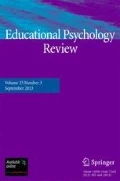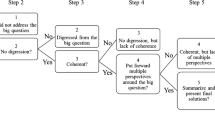Abstract
This article presents a framework to help teachers facilitate small group discussions about stories children read. Collaborative reasoning discussions are intended to create a forum for children to listen to one another think out loud as they learn to engage in reasoned argumentation. Children use personal experiences and evidence from the stories to support their conclusions and consider each other's points of view. Excerpts from an ongoing study of 12 fourth-grade classrooms in rural, urban, and suburban settings are used to illustrate four characteristics of cognitive reasoning: (1) children's response to text; (2) children's use of text to consider multiple possibilities; (3) children's use of tools for persuading others; and (4) children's control of topic and turn-taking.
Similar content being viewed by others
References
Anderson, R., Chinn, C., Waggoner, M., and Nguyen, K. (1998). Intellectually stimulating story discussions. In: Osborn, J., and Lehr, F. (eds.), Literacy for All: Issues in Teaching and Learning, Guilford Press, New York, pp. 170-196.
Anderson, R., Nguyen-Jahiel, K., McNurlen, B., Archodidou, A., Kim, S., Reznitskaya, A. (2001). The snowball phenomenon: Spread of ways of talking and ways of thinking across groups of children. Cogn. Instruct. 19(1): 1-46.
Angell, R. (1964). Reasoning and Logic, Appleton-Century-Crofts, New York.
Cazden, C. (2001). Classroom Discourse: The Language of Teaching and Learning, Heinemann, Portsmouth, NH.
Chinn, C., and Anderson, R. C. (1998). The structure of discussions that promote reasoning. Teach. Coll. Rec. 100(2): 315-368.
Chinn, C., Anderson, R., and Waggoner, M. (2001). Patterns of discourse in two kinds of literature discussion. Read. Res. Q. 36(4): 378-410.
Gardiner, J. (1980). Stone Fox, Crowell Junior Books, New York.
Giff, P. R. (1990). Ronald Morgan Goes to Bat, Puffin Books, New York.
Holmes, E. T. (1977). Amy's Goose, Crowell, New York.
Kim, S., Anderson, R., McNurlen, B., Archodidou, A., Nguyen-Jahiel, K., Reznitskaya, A. (2002). Do Fourth Graders Prefer Open or Teacher-Controlled Discussions? Center for the Study of Reading, Champaign, IL.
Kuhn, D. (1992). Thinking as argument. Harv. Educ. Rev. 62(2): 155-178.
Munch, R. (1983). The Paperbag Princess, Annick Press, Toronto, ON.
Prasad, N. (1987). My name is different. In: Cullinan, B. E., Farr, R. C., Hammond, W. D., Roser, N. L., and Strickland, D. (eds.), Crossroads, Harcourt Brace Jovanovich, Orlando, FL, pp. 4-20.
Reznitskaya, A., and Anderson, R. C. (2002). Influence of Discussion and Explicit Instruction on the Acquisition and Transfer of Argumentative Knowledge, Center for the Study of Reading, Champaign, IL.
Reznitskaya, A., Anderson, R., McNurlen, B., Nguyen-Jahiel, K., Archodidou, A., and Kim, S. (2001). Influence of oral discussion on written argument. Discourse Process. 32: 155-175.
Rogoff, B. (1995). Observing sociocultural activity on three planes: Paricipatory appropriation, guided participation, and apprenticeship. In: Wertsch, J. B., del Rio, P., and Alvarez, A. (eds.), Sociocultural Studies of Min, Cambridge University Press, Cambridge, England, pp. 139-164.
Waggoner, M., Chinn, C., Yi, H., and Anderson, R. C. (1995). Collaborative reasoning about stories. Lang. Arts 72: 582-589.
Author information
Authors and Affiliations
Corresponding author
Rights and permissions
About this article
Cite this article
Clark, AM., Anderson, R.C., Kuo, Lj. et al. Collaborative Reasoning: Expanding Ways for Children to Talk and Think in School. Educational Psychology Review 15, 181–198 (2003). https://doi.org/10.1023/A:1023429215151
Issue Date:
DOI: https://doi.org/10.1023/A:1023429215151




